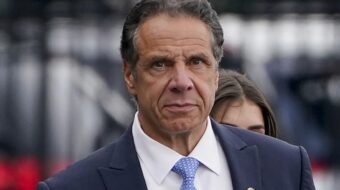Recently Sam Webb, national chair of the Communist Party USA, remarked in one of his reports that in the national elections the working class has to fight for that inch of space where it can have room to organize for further gains. Since we are operating in an electoral field dominated by capitalist, corporate politics, that would be as much as one could expect at this time for election 2008.
Nowhere is this more illustrated than on the subject of health care. Every Democratic presidential candidate talks about health care for all. None of them except Dennis Kucinich endorses HR 676, the Conyers-Kucinich single-payer health care bill. That’s because this bill, if enacted, would take a bite out of health industry profits.
On Oct. 29, The New York Times published an analysis of campaign contributions to the major presidential candidates by the health care industry. Clinton received $2.7 million, Obama $2.2 million, Romney $1.6 million, Giuliani $1.4 million. Why would the health care industry bestow a large portion of their contributions on candidates who, if elected, would seek to enact universal health care legislation? The only logical reason is that these candidates, no matter how much they talk about universal health care, have no intentions of enacting laws that would mean a direct challenge to the profits of the health industry. They may come up with a plan for health care reform, but only if they give the health insurance giants some subsidy protection through the back door. Under massive public pressure, they may even push for the government to negotiate with the pharmaceutical companies to lower the cost of prescription drugs.
The same thing might be said about ending the war in Iraq.
None of the major Democratic candidates are for an immediate pullout from Iraq. Why? When the whole Iraqi nation wants a timetable for the troops to leave starting now, and so do the American people, what is the real reason for these candidates to hesitate on troop withdrawal? Could it be that immediate troop withdrawal might mean the loss of lucrative U.S. oil and other corporate contracts and the resulting loss of profits for the U.S. companies that are trying to get control of Iraqi oil and other resources?
This scenario can become very frustrating to progressive activists. What are we to do? It becomes fertile ground for ideas of third-party presidential candidacies. That would make us feel good. We would get our frustration off our chests. But what would it do for the politics of this country in the current situation? Would we be with the growing labor-community coalitions that are forming across the country, or would we be outside such coalitions, and seen as divisive? Clearly, the latter. Such moves would have us be in “principle” correct and in practice wrong. The bottom line would be that come Election Day 2008, once again the right-wing Republicans would remain in control or at least maintain the minority toehold that up to this point has frustrated liberal and progressive legislation in Congress.
Does this mean that we should keep quiet and support right-wing Democrats just so that the Republicans won’t win? Not really.
The Democrats’ positions are influenced by the extent to which we organize our friends and neighbors to support an immediate pullout from Iraq and real, meaningful health care reform. The only thing that many of these candidates really care about, aside from protecting the profits of the corporations who can make or break them, is how many votes they can win from the public. Thus the more we pressure the candidates in a massive way for a quick end to the war in Iraq and for universal and affordable health care, the more they will respond with promises that we can hold them accountable for once they are elected.
This dialectical dynamic gives us that “inch” — room to struggle for progressive advance, once we get rid of the ultra-right Republican lockdown.
Emil Shaw is a labor and peace activist and New Mexico state chair of the Communist Party USA.









